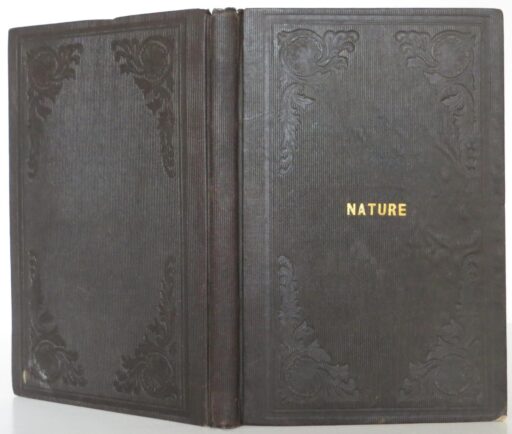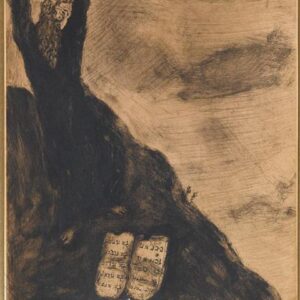There’s a mistake I sometimes make in my close reading of literature. In the classroom work I’m doing, or in the essay I’m writing, I tend to interpret the words, lines, and sentences at the beginning and the middle from the vantage point of the end. I know where the poem or piece of prose has concluded, and I project what I have come to know into what I had earlier read.
In a way, this makes sense. Edith Wharton said that she structured her novels and stories very carefully: “my last page is latent in my first.” But we should remember that the experience of reading is from start to finish. When we begin and as we continue, we don’t know what the destination will be.
This point came to mind the other day when I was rereading Ralph Waldo Emerson’s first book, Nature, published in 1836. Here is the first paragraph of the Introduction. Let’s take it in sentence by sentence, looking at and listening to how it moves:
Our age is retrospective. It builds the sepulchers of the fathers. It writes biographies, histories, and criticism. The foregoing generations beheld God and nature face to face; we, through their eyes. Why should not we also enjoy an original relation to the universe? Why should not we have a poetry and philosophy of insight and not of tradition, and a religion by revelation to us, and not the history of theirs? Embosomed for a season in nature, whose floods of life stream around and through us, and invite us by the powers they supply, to action proportioned to nature, why should we grope among the dry bones of the past, or put the living generation into masquerade out of its faded wardrobe? The sun shines to-day also. There is more wool and flax in the fields. There are new lands, new men, new thoughts. Let us demand our own works and laws and worship.
It is commonly said about this paragraph that Emerson is rebuking our veneration of the past, assailing our undue deference to authority and tradition, and urging us to be original, not secondary, not dependent. This summary, while correct, is also misleading. For it is not faithful to the experience of reading Emerson’s sentences one by one, in sequence.
“Our age is retrospective,” Emerson asserts. A short declarative sentence. Looking backward, contemplating the past: we say that Emerson is objecting to this, but that’s not certain when we read the sentence not knowing what comes later. At first encounter, we might conclude instead that Emerson is commending this aspect of our approach to the past—that it’s good we look back and learn lessons taught by the generations that have preceded our own.
Where do the stresses fall in this sentence? What is its tone? Does Emerson intend for each of the first three words to receive the same emphasis? Or is one to be accented more than the others? And who is Emerson speaking about and to? Who is numbered among the plural “our?”
If we voice the sentence out loud, to an iambic rhythm, the stress will fall on “age.” But age in what sense? “Age” means length of time or existence; the period of maturity; the range of years contemporary with a person’s lifetime; a long time, many years, a hundred years, an indefinite but long phase of time in human affairs. It is this firmly placed but imprecise “age” that builds sepulchers and writes biographies, histories, and criticism. Is all this a bad thing? Shouldn’t we honor the dead and take pride in the written work we have done and are doing?
Perhaps it’s regrettable that while the generations that preceded us beheld God and nature face to face, we see only through their eyes. Then again, it might not be. Maybe we apprehend God and nature with greater depth and understanding because we have the accrued wisdom of those who came before us: they’ve provided illumination that benefits us.
Emerson’s change of direction comes in the next sentences, “Why should not…,” and “Why should not…” Emerson could have written declarative sentences, but it is through questions that he can kindle introspection and inquiry. These are dramatic, even hyperbolic, questions, and there are four negatives in them. It’s an “original relation” not to ourselves, not to others, nation, or world, but, rather, to the universe. “Tradition”—Emerson enjoins us to disengage from and advance beyond it. Christianity is not named. Emerson’s thrust is toward religious “history,” in contrast to (alliteratively blended) the more meaningful “religion by revelation.”
The next sentence is a long one, and Emerson launches it with the somewhat awkward “Embosomed,” that is, to take into or place in the bosom, to shelter closely, a word that might seem not to fit with the diction that Emerson has drawn upon thus far. Set in motion by “stream” and “invite,” the sentence appears to be taking a declarative form that would state the answer to the two questions that Emerson has just asked. But the sentence develops into another question that centers on the trenchant verb “grope,” which means to feel about blindly (as with the hands), or uncertainly or hesitantly to find or touch something.
“Dry bones of the past” echoes Ezekiel 37:4: “Again he said unto me, Prophesy upon these bones, and say unto them, O ye dry bones, hear the word of the Lord.” Emerson then shifts to a clothing image, made dynamic by “masquerade,” which enforces and energizes his vision of our self-defeating predicament.
The next three sentences, terse and emphatic, affirm the resources that we possess and should utilize—the brightness of the sun, the materials from which new attire can be woven, and, with reiterated force, the immense newness that exists in us and in everything.
In his passionate final sentence, “Let us demand…,” Emerson appeals to and confronts us: his injunction is inspiring, bracing, seductive, collaborative, coercive. “Demand” is to ask or call for something urgently, insistently, imperiously, with authority, earnestness, vehemence. The implication is that this is a verbal action we must undertake—and that we have the capacity to accomplish.
From here, we could return to the beginning and make the claim we usually do—that in this paragraph, Emerson is telling us to reject the bondage of the past and transform ourselves into persons who are free, original, and new. But again, I don’t think the sentences deliver this meaning and message when we first read them. Emerson wants us, retrospectively, to realize how complacent and self-limiting so many of us are: our reverence for the dead and gone has prevented us from seeing that we can recreate ourselves and remake the world.
For me, close reading is from moment to moment. I’m always thinking with keen interest and pleasure about the responses of readers and the intentions of writers, intentions as I perceive them in the choices that writers make. When we reread a favorite book, we glean and gather more from it each time. But even then, I remain curious about what the writer was doing that gave me the experience I had the first time through, when the organization of the language was new to me.
William E. Cain is Mary Jewett Gaiser Professor of English at Wellesley College, where he enjoys teaching courses on Ralph Waldo Emerson, Henry David Thoreau, and other American writers. His recent publications include essays on Edith Wharton and Ernest Hemingway.





